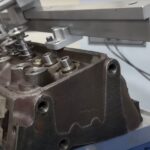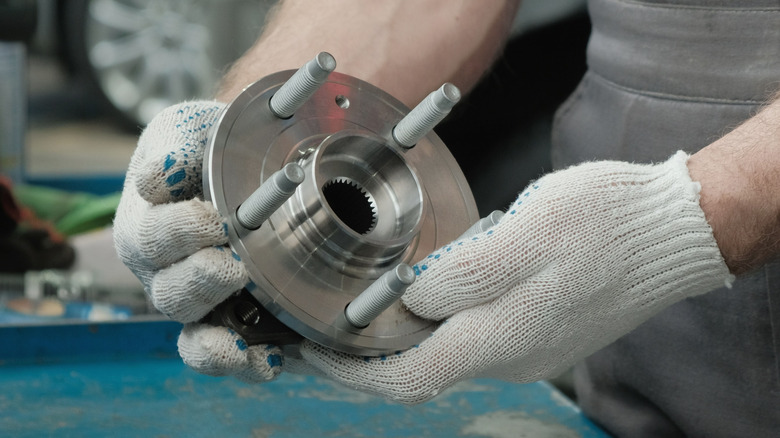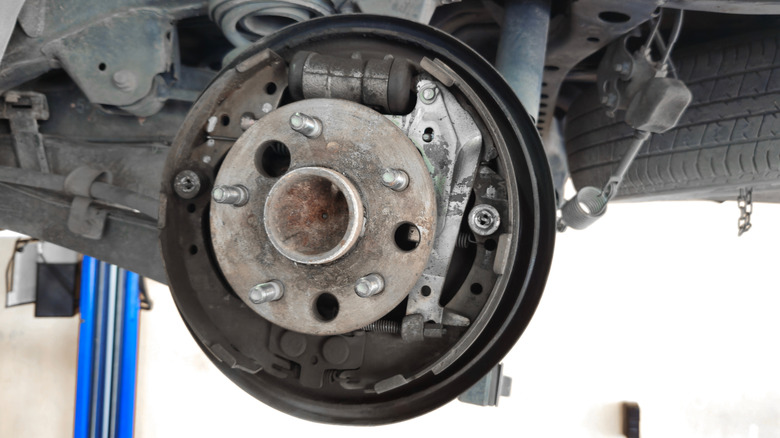It won’t be hard to tell if your vehicle has broken wheel bearings. The most common symptoms of worn wheel bearings are squealing or grinding noises that get louder the faster you go. The noise could emanate from the front or back or the left and right of the vehicle, depending on which wheel bearing is going bad. Sometimes, you might notice a humming noise or clicking sounds coming from the front or rear wheels, which could be mistaken for tire roar or road noise.
Advertisement
The wheel bearings consist of steel ball bearings inside the wheel hub. They enable the wheels to roll smoothly and silently while providing anchor points for the vehicle’s steering, suspension, wheels, and brake components. When a wheel bearing goes bad, the affected wheel will wobble or move unnecessarily, wreaking havoc on the many undercarriage parts that rely on proper alignment to work correctly. As the problem worsens, the grinding or squealing noises get louder, which means the wheel bearings are near total failure.
For instance, a faulty wheel bearing may cause uneven tire wear, wobbly steering, and an illuminated ABS (Anti-lock Braking System) warning light. An easy way to check for broken wheel bearings is to place the car on a lift or raise the affected side with a jack and a heavy-duty jack stand. Next, grab the affected wheel from both sides and try shaking it. The wheel should not move unnecessarily if the wheel bearing is solid. However, replacing the wheel bearing is necessary if it shakes or moves in its axis.
Advertisement
Is it safe to continue driving with bad wheel bearings?
No, we do not recommend driving a car with faulty or noisy wheel bearings. The wheels could fall off the vehicle while driving, which is not a great way to start your day. Broken wheel bearings will cause the affected wheel to wobble incessantly while the car is moving, and this will cause various issues with the steering, suspension, and brakes, like vibrations when braking or turning the wheel.
Advertisement
We had a bruised and battered Mitsubishi Mirage G4 with unusually high miles, and we had to replace the wheel bearings thrice during its useful life. In one instance, the right rear wheel was wobbling badly and making loud, grinding noises, whether moving fast or creeping forward from a stop.
The factory wheel bearings in your car do not require periodic maintenance and are, in most cases, designed to last the life of your vehicle. However, the grease inside the bearings could get contaminated by prolonged exposure to rain, mud, road salts, and sand. Meanwhile, overloading the vehicle or driving over speed bumps, curbs, or potholes could prematurely damage the wheel bearings.
How much does it cost to replace the wheel bearings?
The good news is that you don’t need to replace the wheel bearings on all four wheels if only one side has worn out, but replacing the wheel bearings as a pair wouldn’t be a bad idea. If the wheel bearing in the right wheel hub has gone bad, it would be better to also replace the bearings in the left wheel, but it all depends on your budget.
Advertisement
The bulk of the wheel bearing replacement cost is attributable to the labor. In some cars where the wheel bearings are easier to access and remove, the labor cost could be around $80 to $200. The wheel bearings cost anywhere from $40 to $120 each, depending on the vehicle. You’ll have to pay more if you have a larger vehicle like a full-size SUV or heavy-duty pickup truck, which could reach over $1,000 in parts and labor.
Noisy or broken wheel bearings are a safety concern for any vehicle. It also makes some vehicles almost undrivable. If you notice strange, grinding noises while driving or feel one side of the vehicle wobbling, bring the car to a mechanic as soon as necessary before the issue worsens or the wheels fall off.
Advertisement












